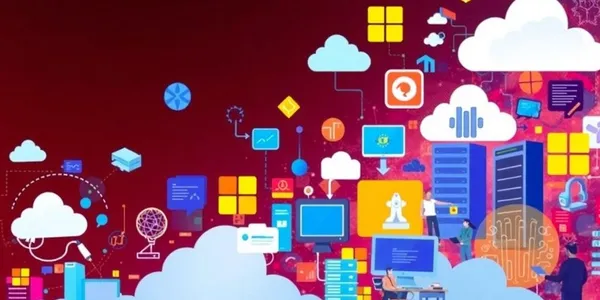Microsoft is making big moves in the tech world, especially with its advances in AI, cloud computing, and productivity tools. From innovative AI solutions to robust cloud services, Microsoft is reshaping how businesses operate and adapt in this fast-paced digital landscape. This article takes a closer look at these developments and how they are setting the stage for a more efficient future.
Key Takeaways
- Microsoft is pushing the boundaries of AI and cloud computing, introducing tools that help businesses work smarter.
- The integration of IoT with Microsoft’s cloud solutions is enhancing operational efficiency for various industries.
- Microsoft 365 is proving essential for modern workplaces, combining productivity tools with powerful cloud capabilities.
- Innovations like the Maia AI Accelerator and quantum computing are set to transform how businesses handle complex challenges.
- Microsoft's commitment to cybersecurity is helping businesses stay protected against evolving threats.
Overview of Microsoft’s Technological Advancements

Microsoft has been busy, especially if you look at the announcements from Ignite 2023. They're pushing hard on AI, cloud computing, and IoT, which is changing how businesses handle digital transformation. It's all about making things more efficient and connected.
Recent Innovations in AI and Cloud Computing
Microsoft is making big moves in AI and cloud. The goal is to give businesses better insights and more capabilities. Think about how Microsoft Fabric and the new Copilots are changing how companies operate. It's a pretty big deal. They're also working on unified data estates, which should help with data management and analytics. That means better decisions and smoother operations for customers. It's all about staying competitive in a fast-moving market.
Impact of IoT on Digital Transformation
IoT is becoming a bigger deal, and Microsoft is right in the middle of it. Azure IoT Operations is designed to bridge the gap between the physical and digital worlds. This is especially useful for industries that want to improve how they operate through IoT. It's about connecting everything and making it smarter. Microsoft is also focusing on security and development tools, making sure businesses can operate safely and developers can build robust solutions. The digital transformation is happening fast.
Empowering Businesses with Microsoft Fabric
Microsoft Fabric is designed to give businesses a centralized platform for data management and analytics. It's supposed to make things easier and more efficient. Here's a quick look at some potential benefits:
- Improved decision-making
- Streamlined operations
- Enhanced collaboration
Microsoft is really pushing to deliver solutions that meet the changing needs of businesses. As technology keeps evolving, Microsoft wants to stay a leader in driving digital transformation and helping companies succeed. They're focused on making sure businesses can adapt and thrive in a competitive environment. It's a big picture kind of thing.
Exploring New Microsoft Technologies in the Evolving Tech Landscape
Microsoft is still pushing forward, revealing new tech that is changing how industries and businesses work. A big part of this change is stuff like Azure Boost and Azure Cobalt, which are made to make AI faster and better.
Advancements in Azure Boost and Cobalt
Azure Boost is all about making AI work better. It speeds things up and cuts down on delays. Azure Cobalt is focused on improving AI too, but it's more about making sure it can handle bigger and bigger tasks for companies. These technologies are designed to work together, providing a comprehensive solution for businesses looking to enhance their AI capabilities. For example, Copilot+ PCs are showcasing the power of these advancements.
Integrating AI into Legacy Systems
One of the biggest challenges for businesses is bringing new AI into old systems. Microsoft is working on ways to make this easier. They want companies to be able to use the latest AI tools without having to get rid of everything they already have. This includes things like the NC H100 v5 Virtual Machine Series, which is designed for mid-range AI tasks. It's about making sure everyone can use AI, no matter how old their systems are.
Proactive Technology Roadmaps for Businesses
To stay competitive, businesses need to plan ahead. Microsoft is helping companies create technology roadmaps that will keep them up-to-date. This means figuring out what new technologies are coming and how to use them. It's about being ready for the future and not getting left behind. Microsoft's approach helps companies adapt to the evolving tech landscape.
Microsoft is helping businesses create technology roadmaps that will keep them up-to-date. This means figuring out what new technologies are coming and how to use them. It's about being ready for the future and not getting left behind. Microsoft's approach helps companies adapt to the evolving tech landscape.
Here's a simple example of how a business might plan its technology upgrades:
| Year | Focus | Technologies to Consider |
|---|---|---|
| 2025 | Cloud Migration | Azure Boost, Azure Cobalt |
| 2026 | AI Integration | Microsoft Fabric, AI Copilots |
| 2027 | Security Enhancements | Advanced Cybersecurity Solutions |
AI and Cloud Solutions Powering Modern Enterprises
AI and cloud solutions are really changing how companies do things and make choices. It's pretty wild how much things have changed in just the last few years. Let's take a look at some of the key areas.
Role of Microsoft Azure in Business Operations
Azure is a big deal for businesses now. It's not just about having servers somewhere else; it's about using a whole bunch of tools to make things run better. Think of it as the backbone for a lot of modern tech stuff.
- It helps with data storage, which is huge because everyone's collecting tons of data.
- It offers computing power, so you can run complex programs without needing a super-computer in your office.
- It provides a platform for building and deploying apps, which is essential for staying competitive.
Enhancing Productivity with Microsoft Copilots
Copilots are like having a smart assistant in your software. They're designed to make everyday tasks easier, which can really add up over time. I was reading that 66% of leaders report they would not hire someone without AI skills. That's a big deal!
- Copilot in Word can help you write documents faster.
- Copilot in Excel can analyze data and create charts.
- Copilot in Teams can summarize meetings and help you stay on track.
I've been using Copilot for a few weeks now, and it's honestly made a difference. I can get through my emails faster, and I don't have to spend as much time formatting documents. It's not perfect, but it's definitely a step in the right direction.
Machine Learning and Cloud Integration
Machine learning is getting more attention, and the cloud makes it possible for more businesses to use it. Instead of needing a team of data scientists and a bunch of expensive hardware, you can use cloud-based machine learning services. This is a game changer for business transformation.
Here's a simple example:
| Task | Traditional Method | Cloud-Based Machine Learning | Benefit |
|---|---|---|---|
| Fraud Detection | Manual Review | Automated Analysis | Faster detection, fewer false positives |
| Customer Service | Human Agents | AI Chatbots | 24/7 availability, lower costs |
| Sales Forecast | Spreadsheets | Predictive Models | More accurate forecasts |
Advancements in AI Accelerators and Quantum Computing

Microsoft is pushing the boundaries of what's possible with AI and computing. It's not just about faster processors; it's about fundamentally changing how we approach complex problems. They're working on stuff that sounds like science fiction, but it's becoming reality.
Introduction of Maia AI Accelerator
Microsoft's Maia AI Accelerator is designed to handle heavy-duty AI workloads in Azure. These chips are built to speed up machine learning models, making data processing faster and more efficient. It's like giving AI a supercharged engine. This means businesses can train complex models quicker and get insights faster. It's a big deal for anyone working with large datasets and demanding AI applications.
The Future of Quantum Computing with Azure
Quantum computing is the next frontier, and Microsoft is making big moves with Azure Quantum. The Azure Quantum Elements and the Majorana 1 chip are huge steps forward. The Majorana 1 chip uses topological qubits, which could lead to processors with a million qubits. That's way beyond what's currently possible. It could revolutionize high-performance computing. Microsoft is partnering with companies like Quantinuum and Atom Computing to bring quantum solutions to businesses sooner than expected.
Transformative Potential of AI and Quantum Integration
AI and quantum computing together? That's where things get really interesting. Azure's quantum solutions can tackle problems that regular computers can't, like complex optimizations and simulations. This could boost innovation in fields like drug discovery and financial modeling. It's about solving problems that were previously unsolvable. The integration of AI and quantum computing is set to transform industries. Microsoft's goal is to make these technologies accessible, so businesses can start using them without waiting decades.
Microsoft is working to make these advanced technologies available to everyone. This means businesses can start experimenting and finding new ways to use AI and quantum computing to solve real-world problems. It's not just about the technology itself, but about how it can be applied to make a difference.
Microsoft’s Commitment to Enhanced Cloud Security
Microsoft takes cloud security seriously. It's not just an add-on; it's built into everything they do. They're constantly working to improve their security measures to protect users and their data. It's a big deal, and they know it.
Advanced Cybersecurity Solutions
Microsoft is investing heavily in advanced cybersecurity solutions. They're using AI and machine learning to detect and respond to threats faster than ever before. Azure Sentinel Azure Sentinel is a prime example, offering intelligent security analytics across the enterprise. It's all about staying one step ahead of the bad guys.
Staying Ahead of Evolving Threats
Cyber threats are always changing, so Microsoft has to keep up. They have a dedicated team of experts who are constantly researching new threats and developing new ways to protect against them. They're also working with other companies and organizations to share information and collaborate on security solutions. It's a constant battle, but they're committed to winning it.
Here's a quick look at how they're doing it:
- Continuous threat monitoring
- Proactive vulnerability assessments
- Incident response planning
Building Trust in Cloud Services
Trust is key when it comes to cloud services. Microsoft knows that users need to feel confident that their data is safe and secure. That's why they're committed to transparency and accountability. They're also working to comply with all relevant regulations and standards. It's all about building a cloud that people can trust.
Microsoft's Secure Future Initiative is built on three core principles: secure by design, secure by default, and secure operations. This initiative ensures that security is a top priority across all aspects of the company's products and services.
The Role of Microsoft 365 in Modern Work Environments
Microsoft 365 has really changed how we work. It's not just about having Word and Excel anymore; it's about creating a connected workspace. I remember the days of emailing documents back and forth – what a mess! Now, everything's in the cloud, and it's way easier to keep track of things.
Combining Productivity Tools with Cloud Services
Microsoft 365 is more than just the sum of its parts. It's the way these parts work together that makes it so useful. Think about it: you can start a document in Word, share it on Teams, and get real-time feedback. It's all connected. This integration is what makes Microsoft 365 a game-changer for productivity.
Benefits of Microsoft 365 for Collaboration
Collaboration is key in today's work environment, and Microsoft 365 really helps with that. Here's how:
- Real-time co-authoring: Multiple people can work on the same document at the same time.
- Integrated communication: Teams allows for instant messaging, video calls, and file sharing.
- Centralized file storage: OneDrive keeps all your files in one place, accessible from anywhere.
Microsoft 365 serves as a central hub for teamwork, allowing employees to access the latest updates, files, and data for their projects in one place, enhancing collaboration and productivity.
Cost Savings and Security Enhancements
Switching to Microsoft 365 can actually save you money. You don't have to buy individual licenses for each program, and you get automatic updates and security features. Plus, the cloud storage can reduce the need for expensive on-site servers. Businesses using Microsoft 365 report improved collaboration, enhanced security, and significant cost savings.
Here's a quick look at potential cost savings:
| Feature | Benefit |
|---|---|
| Cloud Storage | Reduced server costs |
| Automatic Updates | Lower IT maintenance expenses |
| Integrated Apps | Elimination of individual software costs |
Wrapping Up: The Road Ahead for Microsoft
To sum it all up, Microsoft is really changing the game with its latest tech. From AI tools like Copilot to cloud services that make life easier, they’re pushing businesses to work smarter. Companies are using these innovations to streamline their processes and make better decisions. Plus, with the rise of mixed reality and quantum computing, the possibilities seem endless. As we look ahead, it’s clear that embracing these technologies is key for businesses wanting to stay competitive. The future is bright, and it’s all about how we adapt and grow with these changes.
Frequently Asked Questions
What are some of the latest technologies Microsoft is working on?
Microsoft is focusing on AI tools, cloud computing, and IoT to help businesses become more efficient and connected.
How does Microsoft Azure improve business operations?
Azure provides powerful cloud services that help companies analyze data better and make smarter decisions.
What is Microsoft Copilot and how does it help users?
Microsoft Copilot is an AI tool that assists users in tasks like writing documents and managing emails, making work easier.
What advancements are being made in quantum computing at Microsoft?
Microsoft is developing quantum computers that can solve complex problems much faster than regular computers.
How does Microsoft ensure cloud security for its users?
Microsoft uses advanced cybersecurity tools to protect businesses from online threats and keep their data safe.
What benefits does Microsoft 365 offer to businesses?
Microsoft 365 combines tools like Word and Teams with cloud services, enhancing teamwork, security, and saving costs.






